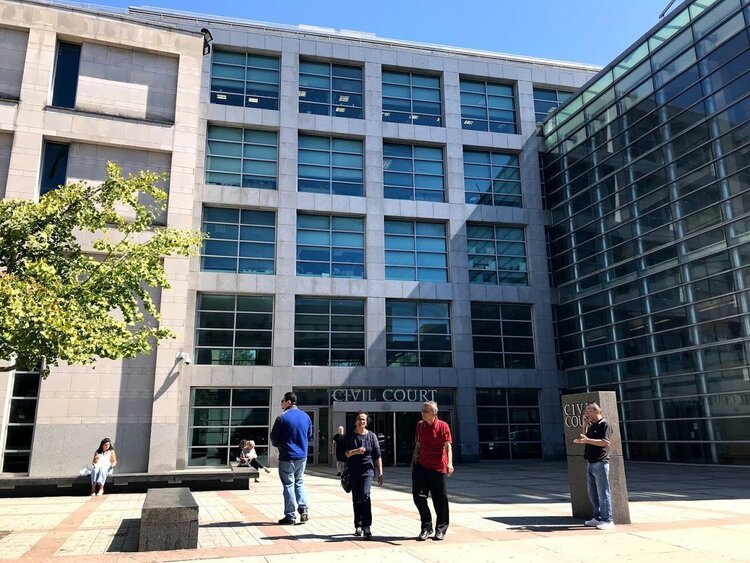Legal aid groups cut intake of Queens clients in Housing Court
/Legal service providers are feeling the pressure as the courts continue calendaring Housing Court cases — to the point where they’re starting to turn clients away. Eagle file photo by David Brand
By Rachel Vick
With the end of pandemic eviction moratoriums, the court ramping up caseloads to get back on track and Right to Counsel expanded citywide, legal service providers say they are hard pressed to meet demands — to the point where they are turning away tenants.
The Legal Aid Society, Legal Services NYC and New York Legal Assistance Group are joining Right to Counsel providers to call on the New York State Office of Court Administration to ease the number of housing court cases being calendared as they struggle to meet the increased demand.
On Tuesday, they announced that they’d be capping the number of Queens clients as a result of the workload.
“What we're seeing right now is Right to Counsel is at a crossroads because we’re being asked as providers to represent clients in every single zip code,” Julia McNally, the housing director for The Legal Aid Society’s Queens Neighborhood Office, told the Eagle. “We didn't have any opportunity during the pandemic to create new attorneys.”
“We have the staffing levels we had despite efforts to recruit and retain and the court has made the decision to return to pre-pandemic levels as quickly as possible and prioritize speed… over justice and certainly over someone’s right to a home,” she added.
Starting on April 5, Legal Aid and NYLAG will be unable to take new cases for the month, and Legal Services NYC will be limiting their intake to 60 cases, providers announced Tuesday.
There have been 4,252 new cases filed in Queens since the beginning of the year, according to court data.
Right To Counsel providers notified stakeholders like OCA in November of their concerns about being overwhelmed.
McNally’s concern lies in the uncertainty about what will happen to the would-be clients who might be left in the lurch, but hopes that judges will adjourn cases without counsel and that organizations will educate community members about their rights under the new program.
“We don't know what's going to happen; the hope is the court puts cases on hold but we’re concerned they may not. At this point [OCA] is not willing to slow things down,” she said. “ The willful denial is stunning.”
“We pride ourselves on providing every person with advice they're entitled to in a challenging area of the law that is continuously changing, and holistic services,” she added. “There's just no way to do that if we continue to have to assign cases.”
McNally said the high-volume calendar and increasingly overworked attorneys creates a cycle in a problem that is not only “manufactured,” but has solutions.
OCA spokesperson Lucien Chalfen said that court administrators are in conversation with the Office of Civil Justice, which contracts the providers, about the issue but that the court is not concerned about a negative impact.
“We have repeatedly maintained that the inability of Right to Counsel providers, such as LSNYC and Legal Aid, to meet their contractual obligations and to be able to manage their operations will not adversely affect the functioning of Housing Court,” Chalfen said.
He referenced the potential “tsunami” of filings post-moratorium didn’t happen, but McNally said that new filings alone paint an insufficient picture of the caseload.
Under the expansion, anyone who meets eligibility requirements — renters who earn less than 200 percent of the federal poverty line — with a Housing Court case being called is eligible for an attorney regardless of when the case was first filed.
Pre-pandemic, there were only a few neighborhoods in each borough where tenants had unbarred access to counsel as part of a rollout that was expedited to meet the needs of New Yorkers facing housing challenges.
There are currently more than 200,000 eviction cases pending in New York City Housing court, and 7,000 new cases filed each month, according to the Bronx Times.
Prior to the implementation of RTC, one percent of tenants were represented by an attorney in eviction cases. After all tenants with calendared eviction cases had access to legal services, 71 percent of tenants who appeared in Housing Court had full representation.
The recommendation for cases to be calendared based on capacity was made after discussion with the New York City Human Resources Administration’s Office of Civil Justice.
Last month, Legal Services NYC had to reduce the number of Bronx cases it took on but the courts moved cases forward sans representation — according to OCA, the 475 cases were sent to resolution parts.
“We are facing a crisis in our housing courts right now with tenants facing eviction without representation,” said Raun Rasmussen, executive director of Legal Services NYC. “Now more than ever, we need the court’s and the city’s help to find solutions that ensure as many tenants as possible get the legal help they need to stay in their homes. We all fought hard to make the Right to Counsel a reality and we must all work together now to make sure we continue to make good on our promise of free legal representation for all tenants who need our help.”




